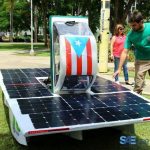Undergraduate Programs
The undergraduate engineering curricula have been designed to provide a firm educational foundation upon which engineering graduates can build social and professional competence after leaving college and become men and women of high value to modern society.
Bachelor of Science degree in Chemical Engineering
 Chemical Engineering is the branch of engineering that serves those industries, which convert chemically basic raw materials into a variety of products at a large scale. It applies the principles of conservation of mass, energy, and momentum together with the fundamental principles of engineering, mathematics, chemistry, physics, life sciences, economics, and social sciences, to the development of the optimum use of natural resources. For more information go to the Chemical Engineering Department Web site.
Chemical Engineering is the branch of engineering that serves those industries, which convert chemically basic raw materials into a variety of products at a large scale. It applies the principles of conservation of mass, energy, and momentum together with the fundamental principles of engineering, mathematics, chemistry, physics, life sciences, economics, and social sciences, to the development of the optimum use of natural resources. For more information go to the Chemical Engineering Department Web site.
Bachelor of Science degree in Civil Engineering
Minor in Integrated Practice in Construction Engineering and Architecture Program
 Civil Engineering encompasses a broad range of public and private infrastructure projects for improving the world’s large-scale environment with the most innovative and up-to-date technology. Highways, bridges, railroads, dams, docks and wharves, airports, launching facilities, multistory buildings, industrial structures, water, air, and land conservation and protection, and water distribution systems, industrial and residential waste treatment systems, tunnels, and transit systems supported by computer aided design and geographical information systems are some examples of the work performed by civil engineers. For more information go to the Civil Engineering and Surveying Department Web site.
Civil Engineering encompasses a broad range of public and private infrastructure projects for improving the world’s large-scale environment with the most innovative and up-to-date technology. Highways, bridges, railroads, dams, docks and wharves, airports, launching facilities, multistory buildings, industrial structures, water, air, and land conservation and protection, and water distribution systems, industrial and residential waste treatment systems, tunnels, and transit systems supported by computer aided design and geographical information systems are some examples of the work performed by civil engineers. For more information go to the Civil Engineering and Surveying Department Web site.
Bachelor of Science degree in Surveying and Topography
 Surveying students will be enrolled in a program that covers a wide spectrum of activities from the very basic plane surveying, to cartography, photogrammetry, geodesy, and astronomy. The student will have the opportunity to apply theory into practice, through laboratory sessions and a summer camp. The program has been designed to meet the needs and the qualification criteria of the Board of Examiners of Engineers, Architects, and Surveyors of Puerto Rico, the Society of Engineers and Surveyors of Puerto Rico, and the surveying profession itself. For more information go to the Civil Engineering and Surveying Department Web site.
Surveying students will be enrolled in a program that covers a wide spectrum of activities from the very basic plane surveying, to cartography, photogrammetry, geodesy, and astronomy. The student will have the opportunity to apply theory into practice, through laboratory sessions and a summer camp. The program has been designed to meet the needs and the qualification criteria of the Board of Examiners of Engineers, Architects, and Surveyors of Puerto Rico, the Society of Engineers and Surveyors of Puerto Rico, and the surveying profession itself. For more information go to the Civil Engineering and Surveying Department Web site.
Bachelor of Science degree in Electrical Engineering
 Electrical Engineering integrates mathematical and scientific principles of electricity and magnetism to analyze electrical phenomena and to design electrical systems. Electrical and electronic systems are present in almost any aspect of our daily lives, ranging from the generation of electrical power vital to the social and economic well-being of society, to appliances, instruments, and devices at home and at work. Therefore, our Electrical Engineering program is designed to prepare students for a wide-range of professional activities involving design and implementation of electrical systems. For more information go to the Electrical and Computer Engineering Department Web site.
Electrical Engineering integrates mathematical and scientific principles of electricity and magnetism to analyze electrical phenomena and to design electrical systems. Electrical and electronic systems are present in almost any aspect of our daily lives, ranging from the generation of electrical power vital to the social and economic well-being of society, to appliances, instruments, and devices at home and at work. Therefore, our Electrical Engineering program is designed to prepare students for a wide-range of professional activities involving design and implementation of electrical systems. For more information go to the Electrical and Computer Engineering Department Web site.
Bachelor of Science degree in Computer Engineering
 Computer Engineering integrates computer science and electronics principles to analyze and design computer systems. The Computer Engineering program encompasses all aspects of design, theory and practice related to systems of digital and analog computation and information processing; components and circuits for computing systems; relevant portions of supporting disciplines; applications, use, and programming of computing devices and information processing systems; and the use of computers in electrical and electronic engineering. For more information go to the Electrical and Computer Engineering Department Web site.
Computer Engineering integrates computer science and electronics principles to analyze and design computer systems. The Computer Engineering program encompasses all aspects of design, theory and practice related to systems of digital and analog computation and information processing; components and circuits for computing systems; relevant portions of supporting disciplines; applications, use, and programming of computing devices and information processing systems; and the use of computers in electrical and electronic engineering. For more information go to the Electrical and Computer Engineering Department Web site.
Bachelor of Science degree in Computer Sciences and Engineering
 Computer Science and Engineering offers a wide and flexible formation in different aspects associated with the analysis, design, and implementation of computing systems, including computer networking, artificial intelligence, databases, computer graphics, web applications, mobile devices, the design and implementation of programmable languages, and the computer architecture. For more information go to the Computer Science and Engineering Department Web site.
Computer Science and Engineering offers a wide and flexible formation in different aspects associated with the analysis, design, and implementation of computing systems, including computer networking, artificial intelligence, databases, computer graphics, web applications, mobile devices, the design and implementation of programmable languages, and the computer architecture. For more information go to the Computer Science and Engineering Department Web site.
Bachelor of Science degree in Software Engineering
 The Bachelor of Science Program in Software Engineering is based on the set skills defined by the Institute of Electrical and Electronic Engineers (IEEE). Software engineering is the application of a well-structured, systematically and quantitative methodology in the development, operation, and maintenance of computational programs. For more information go to the Computer Science and Engineering Department Web site.
The Bachelor of Science Program in Software Engineering is based on the set skills defined by the Institute of Electrical and Electronic Engineers (IEEE). Software engineering is the application of a well-structured, systematically and quantitative methodology in the development, operation, and maintenance of computational programs. For more information go to the Computer Science and Engineering Department Web site.
Bachelor of Science degree in Industrial Engineering
Black-Belt in Training Certificate
 Graduates from the Industrial Engineering program are instrumental in planning, designing, implementing and evaluating products, services, and systems which integrate people, materials, equipment, and information for the progress and improvement of the quality of life of humankind. For more information go to the Industrial Engineering Department Web site.
Graduates from the Industrial Engineering program are instrumental in planning, designing, implementing and evaluating products, services, and systems which integrate people, materials, equipment, and information for the progress and improvement of the quality of life of humankind. For more information go to the Industrial Engineering Department Web site.
Bachelor of Science degree in Mechanical Engineering
 Students wishing to develop a strong engineering basis to their work in Bioengineering, Aerospace Engineering, Automotive Engineering and Renewable Energy are encouraged to pursue their interests in the Department of Mechanical Engineering. These engineering areas are interdisciplinary fields that include design, dynamics, solid mechanics, controls, fluid mechanics, heat and mass transfer, thermodynamics, robotics and manufacturing. For more information go to the Mechanical Engineering Department Web site.
Students wishing to develop a strong engineering basis to their work in Bioengineering, Aerospace Engineering, Automotive Engineering and Renewable Energy are encouraged to pursue their interests in the Department of Mechanical Engineering. These engineering areas are interdisciplinary fields that include design, dynamics, solid mechanics, controls, fluid mechanics, heat and mass transfer, thermodynamics, robotics and manufacturing. For more information go to the Mechanical Engineering Department Web site.
Minor Concentrations and Curricular Sequences
Minor Concentrations and Curricular Sequences complement, enrich, expand, and diversify the academic preparation that a bachelor degree offers; and to promote the formation of a more versatile student, capable of performing effectively on different scenarios. Both opportunities consist of a series of courses which provide students with a reasonable knowledge and skills in a selected area. Although the University of Puerto Rico at Mayagüez offers a diversity of minor concentrations and curricular sequences, the following are administered by the College of Engineering programs:
-
Curricular Sequence in Materials Science and Engineering
-
Integrated Practice in Architecture and Civil Engineering
-
Minor in Management of Service Processes
-
Minor in Aerospace Sciences and Engineering
-
Minor in Computer Sciences and Engineering
-
Minor in Project Management
-
Minor in Pharmaceutical Engineering
For more information about program requirements please review the Undergraduate Academic Catalogues.
